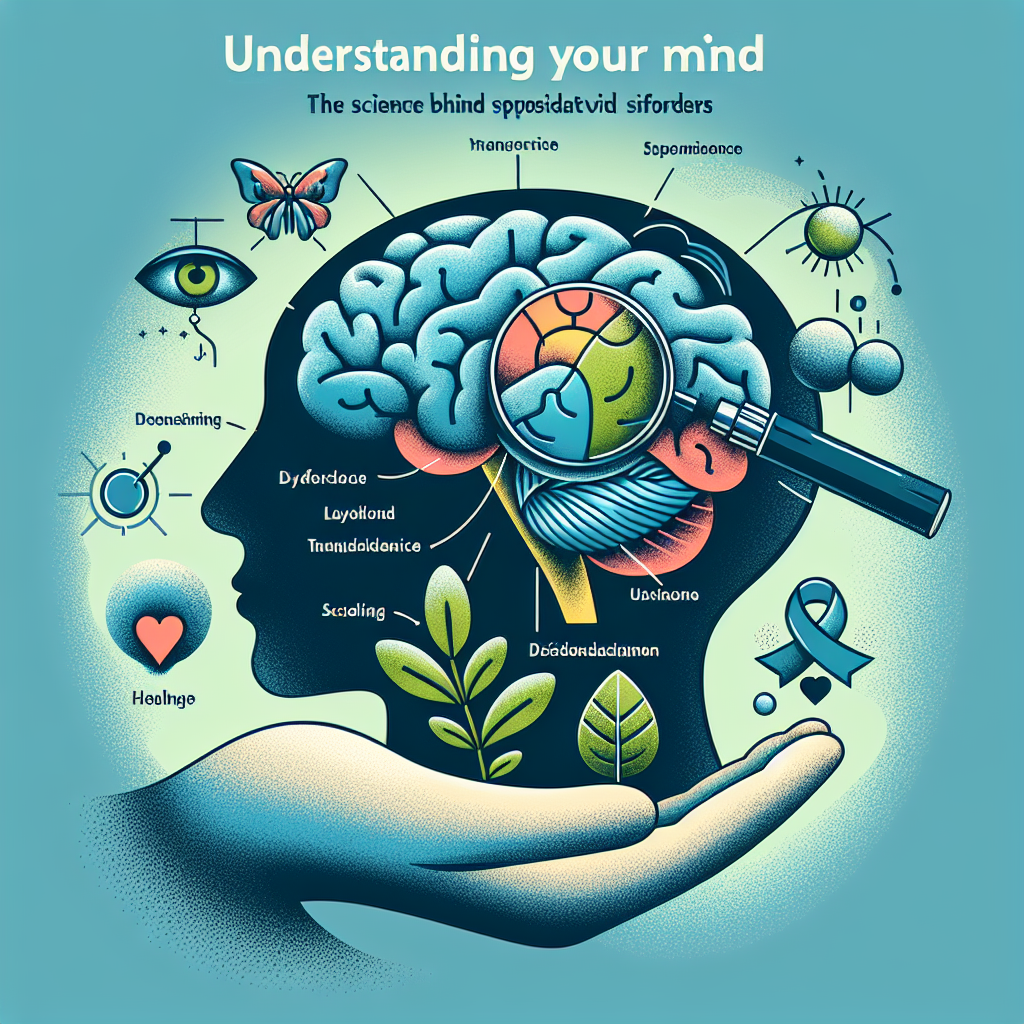
Understanding Your Mind: The Science Behind Dissociative Disorders and Their Management
Introduction: Unlocking the Mysteries of the Mind
In a world overflowing with information, it’s easy to underestimate the complexity of our minds. For some, mental health becomes an intricate puzzle; among those puzzles are dissociative disorders, potent disruptions that profoundly impact how individuals perceive reality and themselves. Understanding Your Mind: The Science Behind Dissociative Disorders and Their Management is not just a phrase; it’s a journey into the depths of human experience that has captivated researchers, clinicians, and those affected. By exploring what dissociative disorders are, their underlying causes, and effective management strategies, we can begin to unveil the mysteries that enshroud this fascinating aspect of human psychology.
What Are Dissociative Disorders?
Dissociative disorders are umbrella terms encompassing various conditions characterized by a disconnection between thoughts, identity, consciousness, and memory. This phenomenon can stem from trauma, stress, or experiences that overwhelm an individual’s capacity to cope.
Types of Dissociative Disorders
Dissociative Identity Disorder (DID): Previously known as multiple personality disorder, DID involves the presence of two or more distinct personality states. These identities may each have unique memories, behaviors, or ways of perceiving the world.
Dissociative Amnesia: In this condition, individuals experience a loss of memory about particular events or personal information, usually in response to stress or trauma.
- Depersonalization/Derealization Disorder: This disorder involves feelings of detachment from one’s self (depersonalization) or from one’s surroundings (derealization). Individuals may feel as if they are observing themselves from outside their body or that the world around them is unreal.
The Science Behind Dissociation
Understanding Your Mind: The Science Behind Dissociative Disorders and Their Management hinges on the biological, psychological, and social factors that contribute to these disorders.
Neurobiological Factors
Research shows that trauma can lead to changes in brain functioning. The amygdala, responsible for processing emotions, may be hyperactive in individuals with dissociative disorders, while the hippocampus, vital for memory formation, may be impaired. These differences can foster feelings of detachment and disconnection.
Psychological Factors
Psychological trauma, especially during formative years, can instigate dissociative responses. These individuals may develop coping mechanisms that involve dissociation as a means of handling overwhelming experiences.
Social Factors
Isolation, unstable relationships, or lack of support often exacerbate symtoms associated with dissociative disorders, leading to a cycle of disconnection from reality and decreased coping skills.
Case Study: The Power of Understanding
Case Study 1: Sarah’s Journey with DID
Sarah, a 28-year-old woman, was diagnosed with Dissociative Identity Disorder following years of trauma. As a child, she experienced significant emotional and physical abuse. Sarah’s case illustrates how early trauma can lead to the development of alternate identities as coping mechanisms.
Analysis: This case underscores that dissociative disorders can manifest not just in isolated incidents but as a response to prolonged adverse experiences. Understanding Sarah’s background provides insights into prevention and therapeutic approaches.
Table 1: Insights from Sarah’s Case
| Factor | Details |
|---|---|
| Trauma | Physical and emotional abuse |
| Symptoms | Creation of alternate identities |
| Management | Long-term therapy focusing on trauma recovery |
| Outcome | Increased self-awareness and coping strategies |
Management Strategies: Reclaiming Your Mind
Understanding Your Mind: The Science Behind Dissociative Disorders and Their Management extends beyond diagnosis; it incorporates effective treatments that can significantly improve quality of life.
Psychotherapy
Cognitive Behavioral Therapy (CBT): This approach helps individuals work through negative thought patterns, encouraging healthy coping strategies.
Trauma-Focused Therapy: Techniques such as Eye Movement Desensitization and Reprocessing (EMDR) have proven effective in processing traumatic memories.
Medication
While no specific medications are approved for dissociative disorders, antidepressants or anti-anxiety medications can alleviate associated symptoms.
Support Systems
Creating a robust support network is crucial. Family therapy and support groups provide a sense of community and understanding, which can be empowering for individuals grappling with these disorders.
Addressing Common Concerns
FAQ 1: What triggers dissociative disorders?
Dissociative disorders are often triggered by traumatic experiences, especially during childhood. Factors such as chronic stress, abuse, or severe emotional distress can elevate the likelihood of dissociation.
FAQ 2: Can dissociative disorders be cured?
While dissociative disorders may not have a definitive "cure," many effective treatment options can help individuals manage their symptoms and lead fulfilling lives.
FAQ 3: How long does treatment take?
The duration of treatment varies based on individual circumstances, complexity of the disorder, and ongoing support. Many individuals find significant improvement over months to years of therapy.
FAQ 4: Are dissociative disorders common?
Research indicates that dissociative disorders are underdiagnosed, but they can impact a substantial number of individuals, particularly those with histories of trauma.
FAQ 5: Can I help someone with a dissociative disorder?
Supporting someone with a dissociative disorder involves understanding, patience, and encouraging them to continue with their treatment plan. Listening without judgment is vital.
Conclusion: The Journey Towards Understanding
Understanding Your Mind: The Science Behind Dissociative Disorders and Their Management is not merely an academic endeavor; it’s an exploration of resilience, recovery, and self-discovery. Through understanding how trauma impacts the mind and employing effective management strategies, individuals can reclaim their lives from the clutches of dissociative disorders.
As we continue to explore the depths of our minds, let’s foster a compassionate community that supports those on their journeys towards healing. Remember, knowledge is power; it can be the light that guides individuals through the darkest moments of disconnect, ultimately illuminating a path to understanding and acceptance.
Final Thoughts
In a world that often stigmatizes mental health issues, making strides towards understanding dissociative disorders can transform lives. Everyone has the potential to reclaim their narrative, learn about their mind, and seek the help they deserve.
By adhering to these insights and emphasizing the need for awareness and sensitivity, we can take significant steps together towards creating more understanding and supportive environments for those affected by dissociative disorders.

















